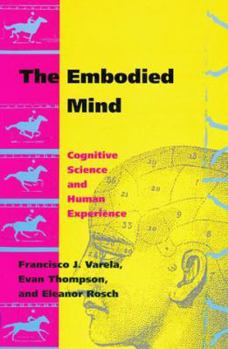The Embodied Mind: Cognitive Science and Human Experience
Select Format
Select Condition 
Book Overview
The Embodied Mind provides a unique, sophisticated treatment of the spontaneous and reflective dimension of human experience. The authors argue that only by having a sense of common ground between mind in Science and mind in experience can our understanding of cognition be more complete. Toward that end, they develop a dialogue between cognitive science and Buddhist meditative psychology and situate it in relation to other traditions such...
Format:Paperback
Language:English
ISBN:0262720213
ISBN13:9780262720212
Release Date:November 1992
Publisher:MIT Press
Length:328 Pages
Weight:0.25 lbs.
Dimensions:0.6" x 5.9" x 9.1"
Age Range:18 years and up
Grade Range:Postsecondary and higher
Customer Reviews
4 ratings
Saving the World Through Buddhism and Brain Science
Published by Thriftbooks.com User , 16 years ago
This is perhaps the most challenging and unusual book I ever read. At first it seems similar to the other books on mind and consciousness that started appearing in the late 1980s, in response to advances in neurobiology and artificial intelligence. But the final chapters confirm that the authors were shooting for something much grander. The writers of this book, which was first published in 1991, were a "dream team" of philosopher, psychologist, and neuroscientist (the late, great Francisco Varela). They wrote for a professional audience. An interested layperson having some familiarity with philosophy of mind issues can keep up, but only with much effort; I had to stop several times to look up a term or research an important concept. But it's worth the effort. You will review a wide variety of interesting ideas and be shown how they relate to one other, including neural networks, societies of mind, object-relations psychoanalysis, adaptive resource theory, multi-chromatic vision, evolutionary drift, nihilism, the delusion of "self", and much more. And you will also read about Buddhism. The authors introduce Buddhist concepts every second or third chapter, noting the parallels between ancient thought and modern science (and the failures of western philosophy). Yes, this does remind one of Capra`s Tao of Physics, although the conceptual juxtapositions aren't as forced. The two biggest problems that cognitive science present for western thought involve the failure to integrate and account for subjective experience, and an increasing sense of social groundlessness as science and history reveal the world to be mostly "relative". Varela and his team believe that these problems lie at the root of a major social crisis that is now being felt in the developed world, i.e. a growing sense of nihilism. When despair and confusion become prevalent and our enemies are at the gates, can the new dark ages be far behind? The response to this gathering storm, the authors argue, can be found in the wisdom of the Buddhist tradition. However, this isn't your father's Buddhism. Varela and company have cleaned it of any supernatural accretions such as hungry ghosts, cosmic nirvana and reincarnation. And although karma is discussed, its definition is narrowed so that it could appear in any graduate textbook on psychology without objection. The Buddhism presented in this book appears to be fully compatible with our modern scientific viewpoint. Through awareness meditation techniques, subjective experience can be grasped and integrated in a way consistent with empiricism. And in that grasping, we can learn to stop grasping. (Love those eastern paradoxes). Instead of fighting the relativity introduced over time by Einstein, quantum physics, psychoanalysis, evolution, complexity theory and cognitive research, we can learn to embrace the end of grounding. Our science can be enriched through "embodiment", expanding science's conceptual boundaries s
Buddhism and CogSci
Published by Thriftbooks.com User , 17 years ago
This book is well worth the price if you are interested in theories of mind and Buddhism. Bert Dreyfus took some of the philosophical references to task in a review that appeared in "Mind" indicating a couple of questions concerning references to Kant's philosophy. He also points out that there is no case made in the book to support the inference that experiences derived from zazen are experiences of "reality." So there are some holes here and there...or maybe assumptions a philosopher would jump on. But I would still recommend this book. It is very interesting and lays out its facit of the Buddhist perspective quite well.
Philosophy of the Body
Published by Thriftbooks.com User , 20 years ago
Reading this book contributed helpfully to my studies of the phenomenology of the embodied experience. The authors argue that we cannot understand ourselves to be isolated bodies controlled by a mind that stands apart from and judges an independent environment. I would recommend this book to anyone who is interested in cognitive science, phenomenological philosophy, philosophies of embodiment, and the relationship of Buddhism to these areas of thought.
This book is amazing!
Published by Thriftbooks.com User , 26 years ago
This ranks up there with Chogyam Trungpa's books for clearly presented insights. Trunpa's genius is making Buddhist ideas come alive for Western readers by clearly presenting Buddhist ideas in everyday terms. This book is a wonderful addition to the same delicious feast, building a bridge from Eastern mindfulness/awareness traditions to Western scientific thought. The effect is to improve our understanding of both. Very powerful and thought-provoking. Each page is like a meal. Hungry? Chew this one slowly and enjoy every bite!






